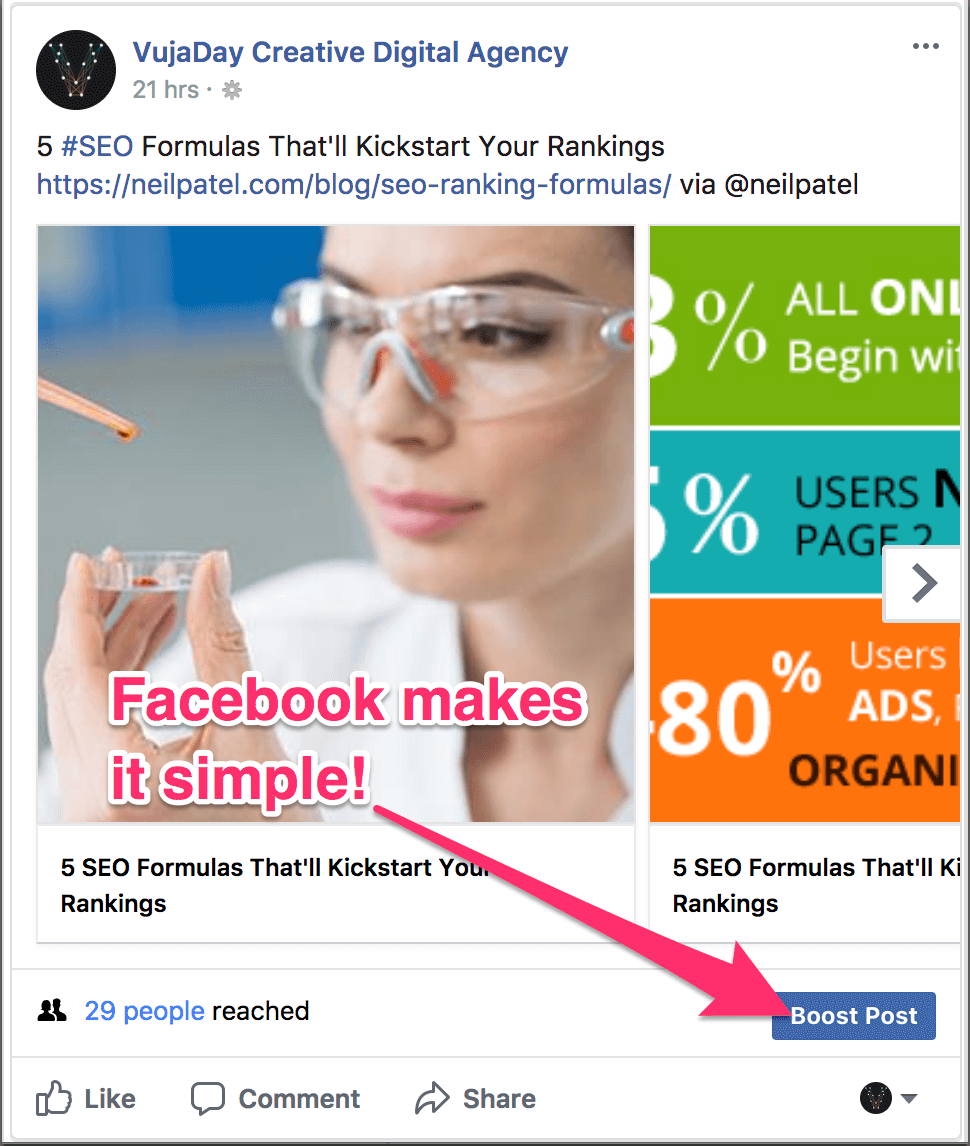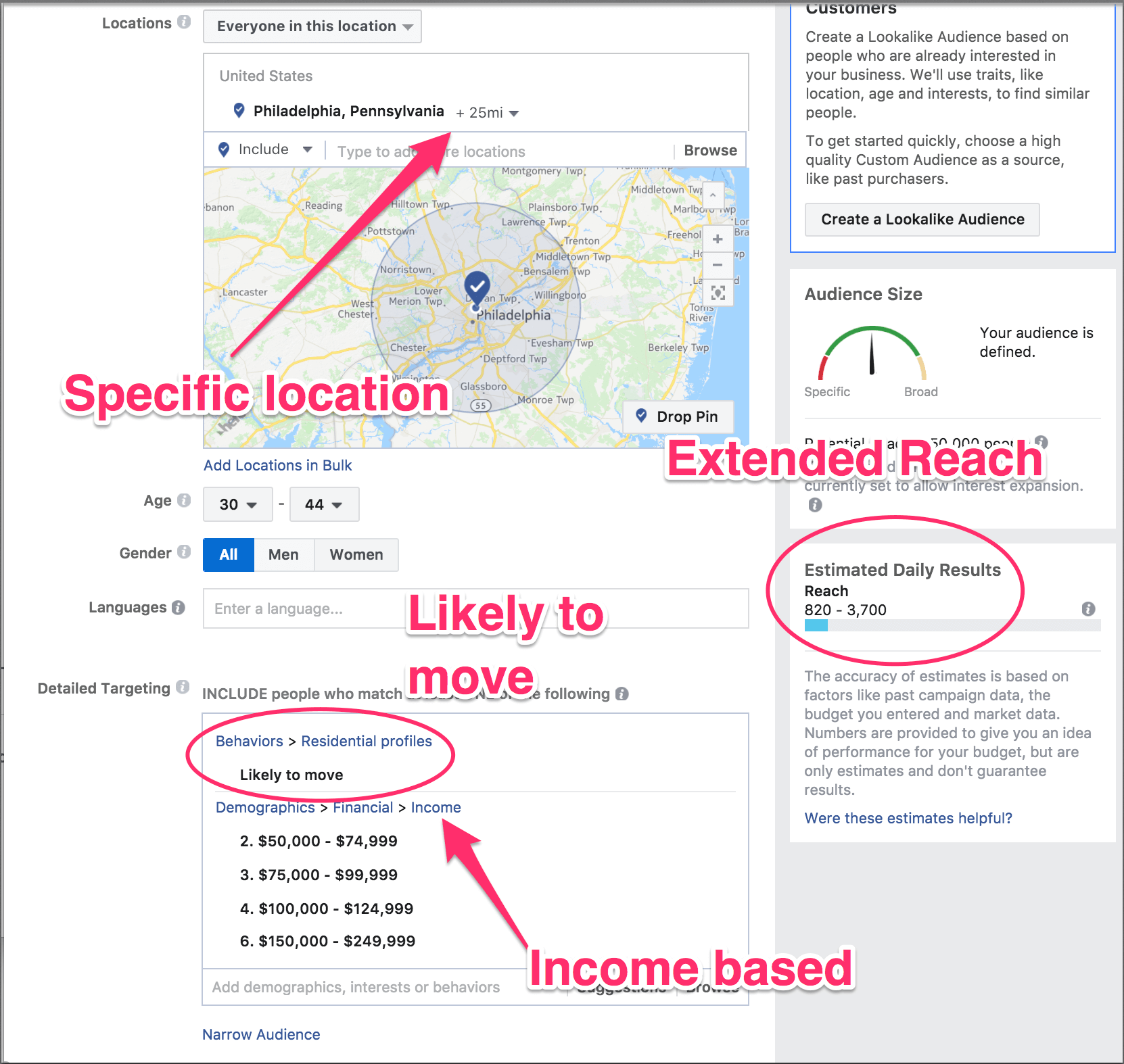Using Facebook Marketing Effectively
I recently wrote a blog post concentrating on a shift in the marketing industry from a traditional approach—involving flyers, postal mail, billboards, and radio ads—to an increasingly digital model driven by social media. In this post, I will focus on leveraging the most widely used social media platform by small businesses, as the cornerstone of an effective Facebook Marketing strategy.
Facebook currently has 1.7 billion active users. Small business owners have taken notice of Facebook’s popularity, and have started to use the social network to engage and attract customers. Independent market research company, BIA/Kelsey offers recent survey statistics that show Facebook is the platform of choice for small and medium businesses (SMBs):
57.4% of the SMBs in our full sample reported using a Facebook page for advertising and promotion, more than any other platform or type of media broken out in our survey.
BIA/Kelsey also shows us that spending on social media advertising continues to increase every year:
In the blog post 5 Steps to Creating a Profitable Facebook Advertising Campaign, Neil Patel, a leading digital marketer, suggests “It’s a lead magnet for your target market when done right.”
However, most small business owners are not quite sure how to implement Facebook Marketing correctly, and it appears that Facebook is well aware of this. Facebook is a publicly traded company that has to make money—so they have escalated up their efforts to make paid advertising a lucrative revenue stream.
The image below shows a recent post that we shared to test the organic reach of a normal informational Facebook business page post. After 24 hours, the post had reached 29 people…..The VujaDay Facebook page has 8,182 followers….so the organic reach is a minuscule 0.35%, SIGNIFICANTLY LESS THAN 1% of the page’s followers!
According to Facebook, recent drops in organic reach were due to changes to the Facebook Algorithm that were meant to do two things:
Facebook also suggests that the decrease in organic reach was not simply meant to earn them more money. Yet, users are forced to use paid advertising to reach more than 1% of their page’s followers. Again, Facebook has 1.7 billion active users, so while I do agree that spammy content had to be cleaned up, my personal news feed remains cluttered with ads. Although making money may not have been the sole reason for the new concentration on paid advertising, it certainly was one of their primary reasons.
Boosting Posts vs. Ads Manager
While Facebook encourages businesses to take advantage of Facebook Marketing tools, their Ad console can be complicated. Meanwhile, Facebook makes it extremely simple to boost a post. Based on our test post, for just $5, we could have increased our reach from 29 organic people reached to 900 – 2,400 people reached over the same duration of 24 hours.
Seems like a no-brainer, right? Well, IT’S NOT! While boosting appears to be the easiest way to reach a wider audience, it ends up being a waste of your marketing budget. Yes, all you have to do is click “Boost Post,” but your post is only optimized for engagement (likes, shares, comments), and as you will see below, this marketing objective does not result in link clicks, leads, conversions, or sales. Facebook Marketing can be one of the most powerful tools for small businesses; however, the effectiveness of your marketing strategy depends on your knowledge of how to use Facebook Ads rather than just boosting posts.
Concerning Facebook’s Ad Manager, the number of targeting options, and marketing objectives can be overwhelming. If you’re not a digital marketer, trying to decide between the 14 different marketing objectives options can be intimidating.
As a small business owner, how are you supposed to know which objective will yield the best results based on your goals? What can the various objectives do for your small business? What is the difference between Traffic, Engagement, and Conversions? While this may be simple for a digital marketer, all of you real estate agents, restaurant owners, hair salon owners, and other business owners do not have the time to learn how to use Ads Manager effectively. Why? Because you are focused on meeting the needs of your current clients and gaining new customers.
Given the simplicity of the boost post option, most small businesses are much more likely to choose this path because it’s extremely easy, and it is supposed to significantly increase your reach.
However, as the image below illustrates, when choosing to boost a post, the targeting options are limited to location and age options; you cannot target specific demographics, location, interests, or behaviors that you can with Facebook Ads.
A recent study by the University of College London revealed something that many of us are already aware of – Humans are hard-wired to follow the path of least resistance. Yes, people are lazy! Dr Nobuhiro Hagura, who led the study contends that “Our brain tricks us into believing the low-hanging fruit really is the ripest.” Think about how we are trained to take the path of least resistance: when we get in the car, Google provides us with the shortest route, with the least amount of traffic. If we want an answer to a question, we ask Siri. Fundamentally, when one option is harder than another, we trick ourselves into thinking it’s the wrong choice.
Consider a real estate agent looking to expand their Facebook marketing reach. They can choose to post a recent listing, and perhaps boost that post to increase their reach. What they will learn is that while the post may get likes, they most likely will not gain leads because they are posting to an audience that by and large does not care about a newly listed home. You may get a like from your friend from high school, or your aunt Sally that likes all of your posts, but you will not gain a lead from a person that is looking to purchase a house. Unfortunately, you also run the risk of having followers hide your content because you’re inundating them with content that is not relevant to them. Rather than simple engagements, the agent needs to focus on viewer action because likes do not translate to sales.
Will that same real estate agent analyze the metrics, determine that the boosted post did not meet their needs, and learn how to use Facebook Marketing Ads? Probably not, because many of us are wired to take the path of least resistance. Besides, will you actually find the time to sit and study the analytics? Although digital marketing is not an occupational priority for most, it’s a necessity to grow your business today. More importantly, it is becoming a prerequisite to simply remain relevant in the years to come.
Statistics show that using Facebook Ads is the much more effective marketing approach—when done properly. Before diving into the Facebook Ads Manager, you need to be aware of your marketing objective. As previously illustrated, Facebook marketing offers a number of goals that should align with your objectives, i.e. brand awareness, website traffic, conversions, engagement, etc. When comparing the targeting options between boosting posts and Facebook Ads Manager, it becomes clear that the boost post option does not offer you any marketing objectives. As previously noted, boosted posts concentrate solely on engagement, which means to increase page likes, comments, and shares. Although this may appear to be an effective way to generate brand awareness, which would eventually lead to increased leads, and sales—it is not.
Several months ago, I took the path of least resistance to test what happens when Facebook tricks you into thinking that a boosted post will reach thousands of people. The image below shows the results of a boosted post that you might think performed really well. Just look at the stats, 4,541 people reached, and 845 engagements, in just 14 days!
If you look closely at the post metrics, the statistics are misleading because they are entirely focused on engagement: 5,052 Impressions, 836 People Taking Action, and 2…..COUNT THEM, 2 BUTTON CLICKS!
I also ran this post on Instagram, which I believed performed even better. 673 likes in 2 weeks! Again, this is misleading because two button clicks were combined between the Facebook and Instagram ads.
So What Can I Do To Reach My Marketing Objectives?
First, stop boosting posts. Next, either spend time moving beyond the path of least resistance, past the low-hanging fruit, to either learn how to implement Facebook marketing through Ads Manager, or hire an expert to do the work for you. VujaDay Creative Digital Agency has done extensive research on Social Media marketing, and will work with you to develop a strategy to meet your organizational goals. It does not need to be a large investment, but it should be a great value based on the results.
Going back to the real estate agent who has suffered through Facebook posts resulting in zero leads, let’s contemplate another scenario. Rather than boosting a recent listing post, the agent will gain much more success through Ads Manager because of the marketing objectives and targeting options. The agent can concentrate on Interests, and Behaviors of their target audience, which can be much more specific than the options available through post boosting.
For example, did you know that, Facebook has a behavioral category for Likely to Move? Have you ever wondered how Facebook is able to put exactly what you are interested in, in your news feed? Well, they maintain extensive data based on your online behavior, i.e. which sites you visit, what you are searching for online, and more. Facebook is watching you! With this revealing data, the real estate agent can use these behaviors for their benefit. Next, the realtor can also target specific locations, and age ranges. If he or she is located in Philadelphia, it does not make sense to run the ad in Los Angeles, Houston, or Chicago. You’re throwing away money! Targeting options also allow the agent to concentrate on Philadelphia and surrounding areas, or specific zip codes. Further, detailed targeting will allow the agent to concentrate on specific income ranges, which will be extremely helpful, including only those who can afford the specific listing.
As a small business owner, the goal for your Facebook marketing posts and ads should not be to just increase engagement—likes and comments do not pay the bills. Your goal should be to get people to take action, such as Website visits, scheduled phone calls, subscriptions, purchases, and sign ups. You will have to move beyond the path of least resistance. That means either learning how to use Facebook Ads Manager effectively, or working with an agency that will design an action plan based on your specific marketing goals. At VujaDay, we believe that seeing results is the only way we can convince you. Don’t commit thousands of dollars without knowing why Facebook marketing ads are a solid investment for your business.
Here is our offer: Invest in our digital marketing services for one month. We will send you a simple questionnaire to learn your marketing objectives. We will review the results on the phone with you. We will show you the ad we create for your approval. Then we will show you the results through the analytics of your Facebook ad. If the results do not impress you, do not hire us. We are confident that we will earn your trust to develop a cost effective, on budget, targeted marketing plan to harness the power of Facebook for your business. Click here to get started. Either way, if you choose not to leverage the most powerful marketing tool at your disposal, you will lose out on the opportunity to compete, sustain, and grow.














2 Comments